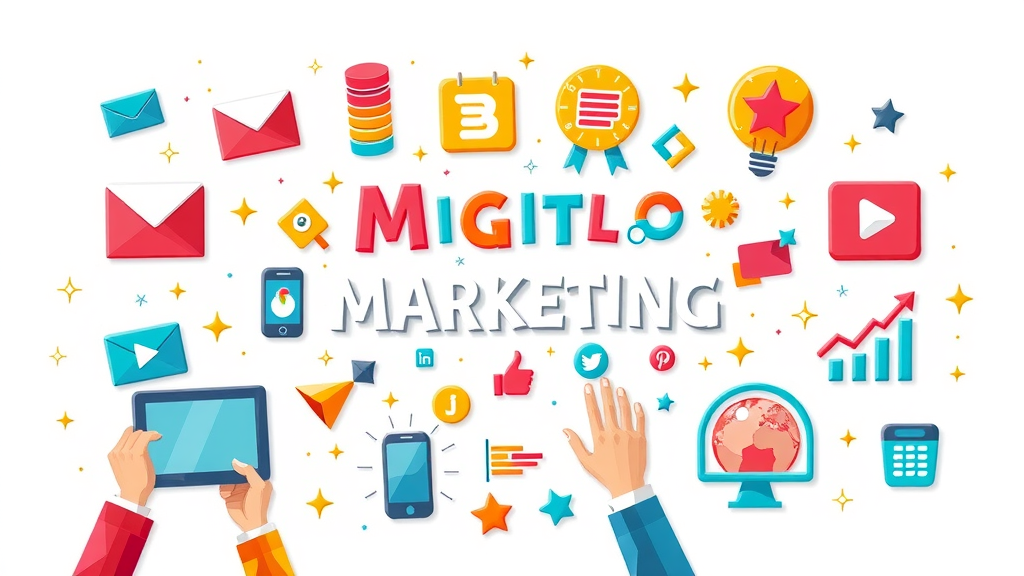Uncovering the Truth: A Surprising Fact About Digital Marketing ROI
Did you know that small businesses leveraging multiple digital marketing channels can boost their conversion rates by up to 300%? That’s right—even with a tight marketing budget, mixing the right digital marketing channels can change everything for small businesses hoping to grow fast. If you're wondering which digital marketing channels provide the best ROI for small business marketing budgets, you’re in the right place. This guide gives you insider tips, practical strategies, and honest answers to your pressing marketing questions, helping you stretch every marketing dollar for maximum impact.
"Businesses using multiple digital channels see conversion rates improve by up to 300%." — Source: Smart Insights

Key Takeaways: Which Digital Marketing Channels Give the Best ROI on Small Budgets?
Discover which digital marketing channels offer the best ROI for small marketing budgets
Get actionable insights for small business owners
See practical recommendations for optimizing your marketing strategy
Learn the pros, cons, and cost-effectiveness of every leading digital channel
What You'll Learn in This Guide
How to evaluate digital marketing channels for ROI
Breakdown of major digital marketing channels for small business
Budget-friendly tips for maximum return
Real-world data on marketing channel performance
Quick strategies to boost your marketing campaigns
Understanding ROI in Digital Marketing for Small Budgets
Defining ROI in Digital Marketing Channel Selection
Return on investment (ROI) measures the profit generated from your digital marketing efforts relative to your marketing budget, helping small businesses optimize their marketing channels for maximum effectiveness. In digital marketing, ROI helps you decide where to put your money so you get the most customers for every dollar. For small business owners with a limited marketing budget, selecting the best digital marketing channel is crucial. You’ll want to focus on marketing channels that prove to deliver qualified leads without breaking the bank. Think of ROI as a way to measure what works and what doesn't—helping you shift your marketing campaign strategy to areas that give real results while cutting out wasteful ad spend.

Why Small Business and Marketing Budget Efficiency Matters
Small businesses often operate with limited marketing budgets, making it essential to select digital marketing channels that deliver the highest ROI. Every marketing dollar counts, so your marketing strategy must focus on efficient digital channels that provide tangible results. That’s why knowing which digital marketing channels offer the best return on investment is vital. By understanding ROI, small business owners can choose a marketing channel that brings in more website traffic, more sales, and more customer loyalty without spending too much. When you stretch your marketing budget using cost-effective digital channels, you can compete with larger brands and still capture your target audience’s attention—making your marketing efforts count.
How Digital Marketing Channels Impact Your Marketing Strategy
Each digital marketing channel—such as email marketing, social media marketing, content marketing, search engine optimization (SEO), and paid search—plays a distinct role in reaching and engaging your target audience, making a well-rounded marketing strategy essential. The best marketing strategy often combines several digital marketing channels to meet different goals. Some digital channels, like email marketing, offer immediate outreach and strong returns, while others, like SEO and content marketing, build slow and steady growth. Picking the right combination helps you attract qualified leads, boost brand awareness, and keep your marketing campaigns efficient. For small businesses, understanding these channels makes all the difference in turning a limited marketing budget into real growth.
As you consider which channels to prioritize, it's also important to understand how local SEO can amplify your results, especially if your business serves a specific community. For a step-by-step approach to targeting the right keywords and boosting your local visibility, check out this beginner's guide to mastering local SEO keyword research.
Overview: Top Digital Marketing Channels for Small Business ROI
Channel |
Average ROI |
Cost Effectiveness |
Best For |
|---|---|---|---|
Email Marketing |
High |
Low Cost |
Customer Retention |
Content Marketing |
High |
Moderate |
SEO, Authority |
Social Media Marketing |
Medium |
Variable |
Engagement, Branding |
Paid Search |
High |
Variable |
Immediate Leads |
SEO (Search Engine Optimization) |
High |
Upfront Investment |
Long-term Traffic |

Email Marketing: A Digital Marketing Channel with Powerful ROI
Why Email Marketing Delivers Consistent Returns
Email marketing stands out as a highly effective digital marketing channel for small businesses aiming to maximize ROI while working within a tight marketing budget. It delivers personal messages right to your customers’ inboxes, ensuring your audience sees your brand regularly. This digital marketing channel helps you reach leads who already showed interest, making them more likely to buy. Email is budget-friendly, easy to measure, and can be automated for convenience. Compared to other channels, email marketing often gives the best return on investment—enabling small brands to drive repeat business, boost conversion rates, and build lasting relationships without high ad spend. Plus, your contact list is a business asset you control.
Best Practices for Maximizing Your Email Marketing Budget
To maximize email marketing ROI on a small marketing budget, focus on audience segmentation—a strategy to send tailored emails to different groups based on their interests or actions. Craft catchy subject lines and helpful messages, and always include a clear call to action. Use free or low-cost tools to automate your campaigns and analyze performance with platforms like Google Analytics. Test different email designs and timings to boost open rates and conversions. With just a little creativity, email marketing can be your most cost-effective channel for customer retention and ongoing sales.
"Every $1 spent on email marketing returns $42 on average." — DMA

Content Marketing: Building Long-Term ROI for Small Businesses
Content Marketing Strategies for Small Business Owners
Content marketing means creating useful blog posts, videos, guides, and infographics that answer your audience’s questions. It's a digital marketing channel that works over time to attract and engage new leads through search engines and social media. For a small business on a tight marketing budget, this approach is smart—one good blog post can bring website traffic and qualified leads for months or even years. Focus on answering customer questions, telling your brand story, and covering topics your target audience cares about. Don’t forget to share content on your social media and include clear calls to action to move readers closer to a sale.

Measuring Success: Content Marketing vs. Other Digital Channels
Good content marketing takes patience, but its long-term impact often beats out paid social or paid search. To measure content ROI, track organic search traffic, social media shares, time on site, and the number of qualified leads generated from blog posts and guides. Tools like Google Analytics can show which topics and pages keep visitors engaged. Unlike quick paid campaigns, content marketing builds brand awareness and positions your business as a trustworthy expert, leading to more conversions over time—especially valuable for small businesses with steady but modest marketing budgets.
Social Media Marketing: Low-Cost, High-Engagement Digital Marketing Channel
Selecting the Right Social Media Channel for Best Return on Investment
Social media marketing is a powerful, low-cost digital marketing channel that enables small businesses to expand their reach, engage new customers, and boost brand awareness while staying within a tight marketing budget. The trick? Pick the right channel for your audience. For example, Facebook works well for reaching a broad target audience and building community engagement. Instagram is perfect for sharing visually creative content, while LinkedIn is best for B2B companies. Focus your efforts on the platforms your customers use most and keep your marketing messages consistent with your brand. Try posting a mix of helpful tips, company news, and product/showcase stories to increase likes, shares, and website visits.
How to Stretch Your Marketing Budget on Social Channels
Even a tiny marketing budget goes further on social media when you prioritize careful targeting, schedule posts during key hours, use free tools, and encourage user-generated content. Social media ads can be effective but start with organic tactics like contests, hashtag campaigns, and customer stories to build loyalty. Monitor engagement stats and adjust your approach, making sure every post supports your marketing strategy. Done right, social media can deliver massive results in engagement and leads, all with low ad spend—especially vital for growing a small business.
"93% of small businesses actively use Facebook to attract customers." — Statista

Paid Search and PPC: Accelerate ROI with a Targeted Marketing Budget
When to Use Paid Search for Small Business Growth
Paid search, a crucial digital marketing channel using platforms like Google Ads, allows small businesses to display targeted ads to users actively searching for related products or services, maximizing ROI on a limited marketing budget. It’s the fastest way to put your offer in front of buyers—but only if you carefully manage costs. With a limited marketing budget, use paid search for promoting special campaigns, launching new products, or driving traffic during slow seasons. Start with narrowly targeted keywords to limit ad spend, and monitor your marketing campaign ROI using conversion tracking tools. Paid search gives you the chance to attract qualified leads, but remember: results depend on smart targeting and constant optimization.

Best Practices to Maximize ROI in Paid Media Marketing
Maximize your paid search and media marketing ROI on a limited marketing budget by targeting high-intent keywords that potential customers use when ready to purchase, ensuring efficient use of your marketing budget. Write clear, compelling ad copy with strong calls to action. Test ad variations and set strict daily limits to avoid overspending. Analyze which ads bring the most conversions and pause those that don't deliver results. Use remarketing to reconnect with visitors who didn’t buy the first time. With careful monitoring and optimization, paid search can turbocharge your qualified lead generation without draining your resources.
Platform |
Avg. Conversion Rate |
Best For |
|---|---|---|
Google Ads |
3-5% |
High-intent leads |
Bing Ads |
2-4% |
Niche Audiences |
Facebook Ads |
1-3% |
Brand Awareness |
Search Engine Optimization (SEO): A Foundational Marketing Channel for Small Budgets
SEO ROI: Short-Term vs. Long-Term Gains for Small Business
Search engine optimization (SEO) enhances your website’s ranking in search engine results, enabling small businesses to attract more organic traffic without paying for each click. For small businesses with modest marketing budgets, SEO is a smart investment. While results aren’t instant—SEO takes weeks or months—it delivers steady website traffic and qualified leads at a lower ongoing cost than paid campaigns. In the short term, you might see more visitors for locally focused keywords. Over time, as your content and website authority grow, your marketing channel ROI multiplies. Patience pays off, as SEO often gives higher returns than ads.
Tips to Maximize SEO on a Limited Marketing Budget
Focus on keyword research to find target phrases your customers use, enhancing your search engine optimization and boosting your digital marketing channel effectiveness. Build helpful pages and blog posts to answer those questions. Optimize your website for speed, mobile use, and readability. Claim and update your Google My Business listing for local search gains. Build a few strong links from trusted websites. Track your progress with Google Analytics and Search Console, updating your tactics as your search engine rankings change. With some time and consistency, SEO can bring a flood of organic search traffic without straining your marketing budget.

Comparing the ROI of Digital Marketing Channels for Small Businesses
Key Metrics for Evaluating Marketing Channel Effectiveness
To determine which digital marketing channels offer the best ROI for small business marketing budgets, track key metrics such as cost per acquisition (CPA), click-through rate (CTR), conversion rate, and total marketing budget spend. Measure how many qualified leads or sales each digital channel brings in versus what you pay. For small business owners, use dashboards or simple data exports from your platform (like Facebook Insights or Google Analytics) to see which channel hits your goals. Looking at numbers honestly reveals which marketing efforts deserve more of your limited funds.

Real-World Examples: ROI Stories from Small Business Campaigns
A local bakery used email marketing to send weekly deals and saw a 40% boost in repeat orders. A startup used content marketing—writing a helpful blog post on “best home office setups”—and doubled its site traffic in three months through organic search. A landscaping company increased their conversion rate by 20% after refining their paid search campaigns for local keywords. These stories show that with the right digital marketing channel and a focused marketing strategy, even small businesses with tiny marketing budgets can see real-world returns on their efforts.
How to Build a Smart Marketing Strategy with Limited Budgets
Crafting an Effective Digital Marketing Plan
Begin your marketing strategy by identifying your target audience—understanding who they are, their interests, and which digital marketing channels they frequent online Next, set clear goals: Is it brand awareness, more qualified leads, or direct sales? Research the ROI of each digital marketing channel for your business. Combine channels that complement one another—for example, using content marketing to attract, email marketing to nurture, and paid search for quick boosts. Test your marketing campaigns, measure results, and improve as you go. Remember, your marketing budget goes further when every channel and message is tightly focused on your real business needs.
Quick List: Recommended Steps for High ROI Digital Marketing Channel Selection
Identify your target audience
Evaluate each digital marketing channel’s ROI potential
Allocate your marketing budget efficiently
Test and measure campaigns for continuous improvement
People Also Ask: Which Digital Marketing Channel Has the Highest ROI?
Answer: Email marketing consistently ranks as the highest ROI digital marketing channel, offering scalability and cost-effective outreach for small businesses with limited marketing budgets.
People Also Ask: Which Marketing Has the Best ROI for Small Business?
Answer: For small business, email marketing and SEO stand out as the marketing channels with the best ROI due to low implementation cost and long-term customer engagement.
People Also Ask: What Is the Most Effective Channel of Digital Marketing?
Answer: Email marketing is widely recognized as the most effective channel for digital marketing, closely followed by content marketing and social media marketing depending on audience type.
People Also Ask: Which Is the Best Channel to Get Better ROI?
Answer: Email marketing provides the highest and most consistent ROI. However, a mix including SEO and social media marketing often yields optimal returns for small to medium businesses.
Frequently Asked Questions: Which Digital Marketing Channels Give the Best ROI for Small Budgets?
How do I measure ROI for different marketing channels? Use tools like Google Analytics to track conversions, sales, or leads from each channel and compare it to your costs. Calculating ROI helps you see what’s working best.
What are some affordable marketing tactics for startups? Try email marketing, social media engagement, and publishing great blog posts. These are low-cost and have been proven effective for startups with minimal ad spend.
How can I boost ROI with a minimal marketing budget? Focus on the channels that perform—often email, content, and local SEO. Automate routine tasks, test messages, and double down on what brings real conversions.
Is influencer marketing cost-effective for small business? Micro-influencers can be affordable and highly effective, especially for niche audiences. Choose those who truly connect with your target audience for best results.
What new digital channel trends are emerging for small budgets? Short-form video, micro-influencer collaborations, and local SEO are rising trends that can be tackled even with tight marketing budgets.
Conclusion: Choosing the Best Digital Marketing Channels for Small Business ROI
Strategic Steps for Ongoing Digital Marketing Success
Choosing the right digital marketing channels is key to achieving more results on small budgets and optimizing your overall marketing strategy. Focus on ROI, adapt, and combine channels for lasting growth.
"The right combination of digital marketing channels can stretch your marketing budget and drive outstanding results for any small business."

As you refine your digital marketing approach, remember that staying ahead of industry shifts can give your business a powerful edge—especially in uncertain times. If you’re looking for advanced strategies to not only survive but thrive during economic slowdowns, explore our comprehensive guide on cutting-edge marketing strategies for small business success. Discover how to adapt your tactics, leverage new opportunities, and build resilience into your marketing plan. The right insights can help you turn challenges into growth, ensuring your business remains competitive no matter what the market brings.
 Add Row
Add Row  Add
Add 








Write A Comment